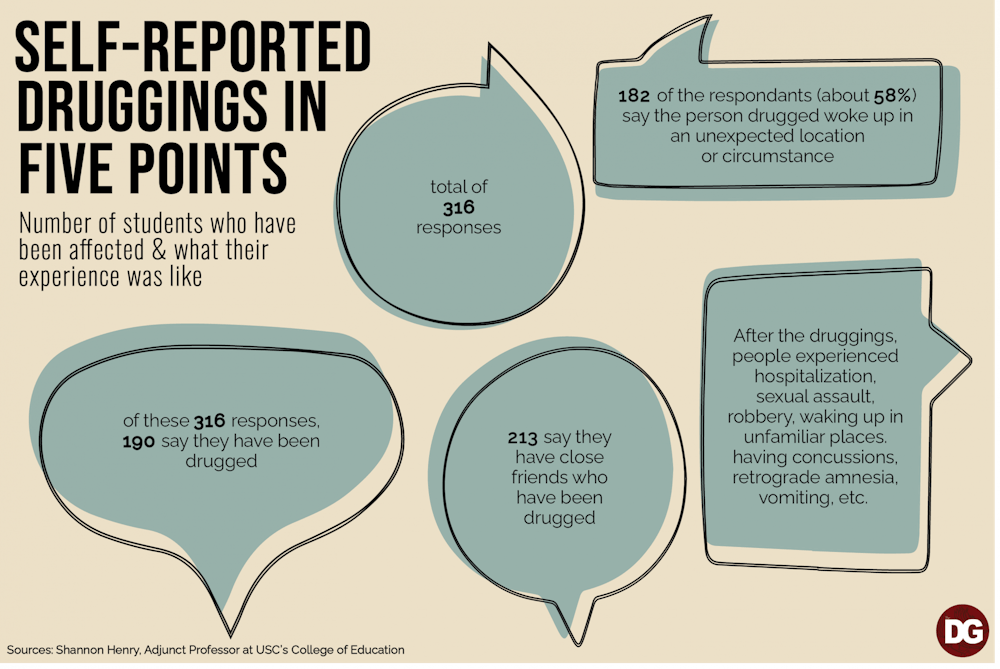A USC adjunct professor has partnered with Prisma Health Center and the Columbia Police Department to create a standard procedure to help victims of involuntary druggings.
The new framework provides a streamlined, set process for law enforcement and healthcare professionals to follow when an individual believes they have been drugged. It also provides victims with a booklet containing information, medical forms and further resources.
The partnership has created a new protocol for how victims are tested for substances and how those tests are processed.
“Those things just weren't in place before, and I searched the country trying to find a system that worked, and nobody that I talked to, from here to California, had anything that had been set up like this,” Shannon Henry, the adjunct professor in the partnership, said. Henry teaches in USC's physical activities program.
Henry created a Google Form earlier this year for people to self-report instances in which they believe they were drugged. The data she collected led her to contact authorities to try and create a framework of procedures for authorities to follow in potential drugging cases.
Of the 316 responses to Henry’s survey, 190 said they suspected they had been drugged, and 213 said they had close friends who believed they were drugged.
Those who were drugged experienced hospitalization, sexual assault, robbery, waking up in unfamiliar places, concussions, retrograde amnesia and vomiting, among other things.
182 of the respondents, or about 58%, said they woke up in an unexpected location or circumstance. Others had friends with them who got them home.
Survivors who come to Prisma will be asked if they want law enforcement involved. The patient will also get a packet with information about the process, medical forms and further resources.
If law enforcement is called, South Carolina Law Enforcement Division (SLED) officers will take a blood and urine sample from the patient to be tested for evidence of drugs.
“At that point, there's a lot of urgency that happens because this is very time-sensitive. The drugs last in the body just a short period of time, and in order for us to have the evidence, we've got to work quickly,” Prisma director of nursing Angela Bruccoli said.
The tests are free and patients can specify if they want the visit to show up on their, or their parent’s, insurance. If a patient is incapacitated, Henry said a friend can fill out the forms for them.
While the hospital can run tests without involving SLED, drug tests and their results obtained by Prisma without SLED involvement will not hold up in court. SLED tests will.
Henry said the samples being tested by SLED test for drugs that commercial kits available for purchase often miss.
“When you're looking at the most common products, they're really looking for things like Rohypnol. They're looking for GHB, potentially; things like that. The combinations of Benadryl and lysine and things like that, they're — they're not looking for. Ketamine, you know, it's kind of rare to find one, I think that's testing for ketamine which seems to be used a lot lately, especially,” Henry said.
The information packet that is given to patients also includes post-trauma resources.
“Our goal is to take care of them, and if they feel that they've been assaulted in some form, then that's what they feel and that's how we're going to treat them. And then we're going to partner with law enforcement in order to help collect, like I said, collect the evidence, and give them the support after — during and after the incident. I think the biggest thing is just, come forward. You’ve got to go forward. That's the only way we're going to get it,” Bruccoli said.
Columbia PD officers have been provided the informational booklet to keep in their patrol cars.
“It was pretty cool how quickly it came together. The community really rallied, and that was really cool to watch,” Henry said.
Henry said the next step is to spread awareness of the informational booklets.
“That's our next step: Making sure that you guys understand that they're available and where to get them and how to ask for them and making sure that if you get the wrong person that says, ‘Well, I don't know what that is, and we can't help you,’ that you keep fighting and say, ‘No, that's not true,'” Henry said.
Editor's note: Kailey Cota contributed to reporting in this article.
Correction (Oct. 18, 2021, at 4:00 p.m.): Shannon Henry was incorrectly stated as being a professor. Henry is an adjunct professor.

